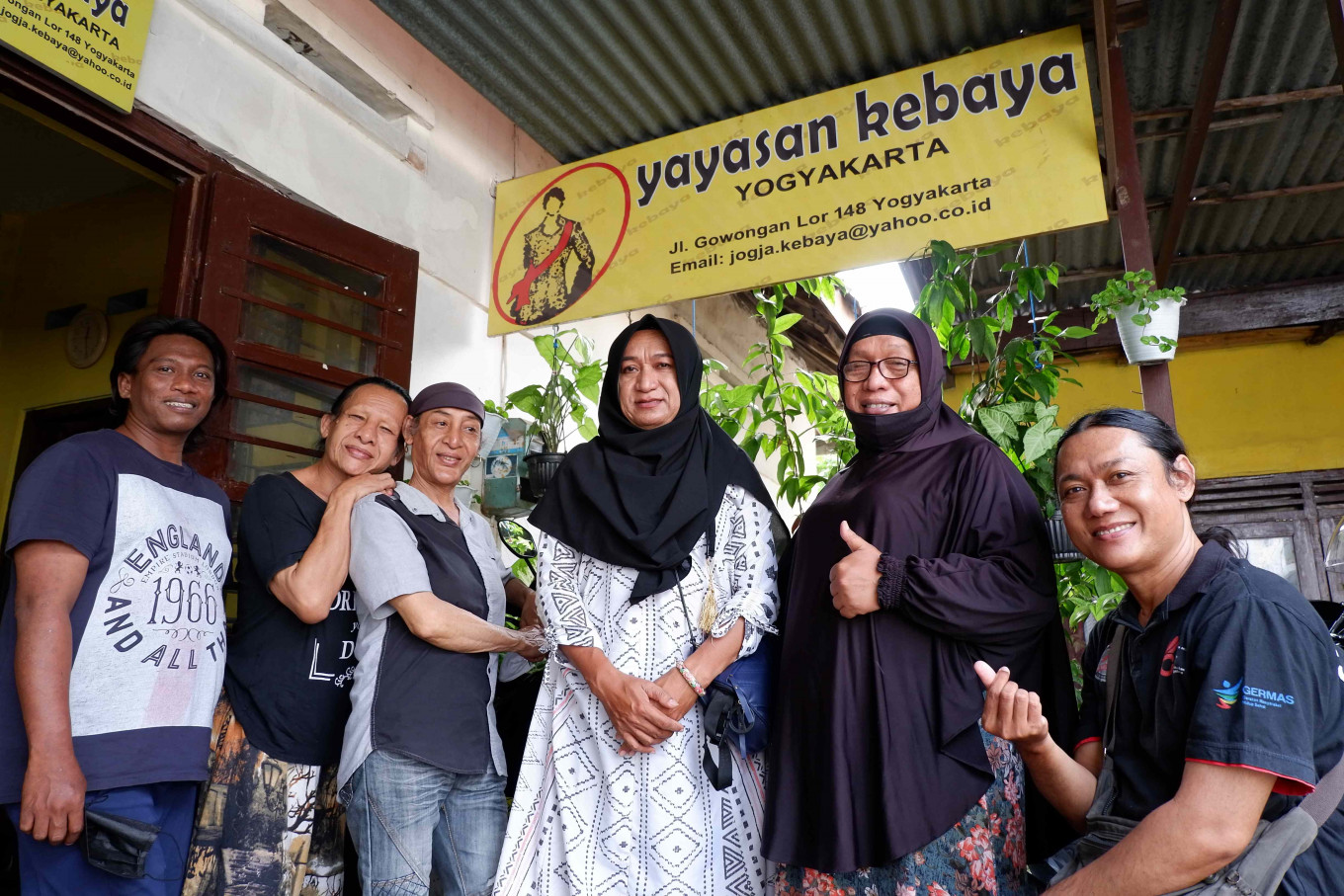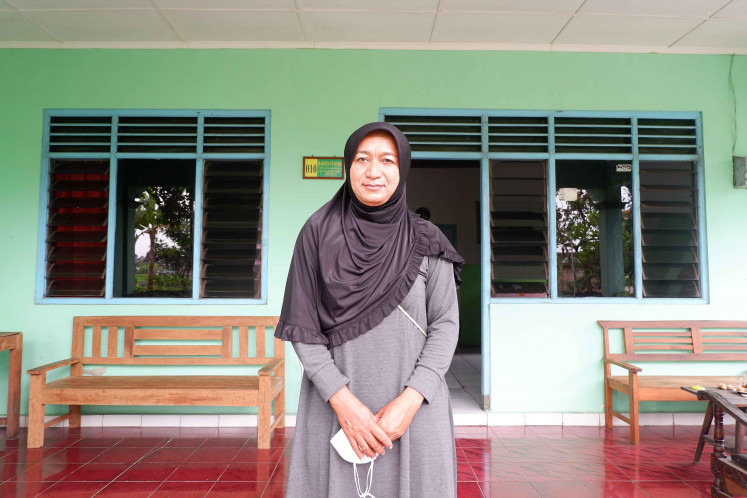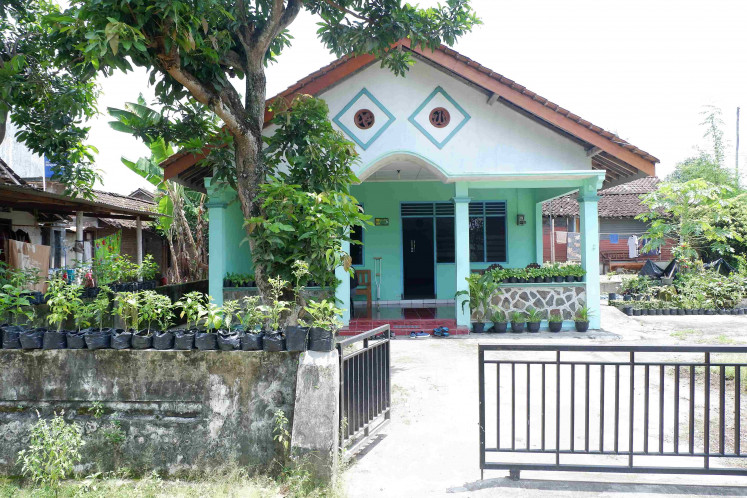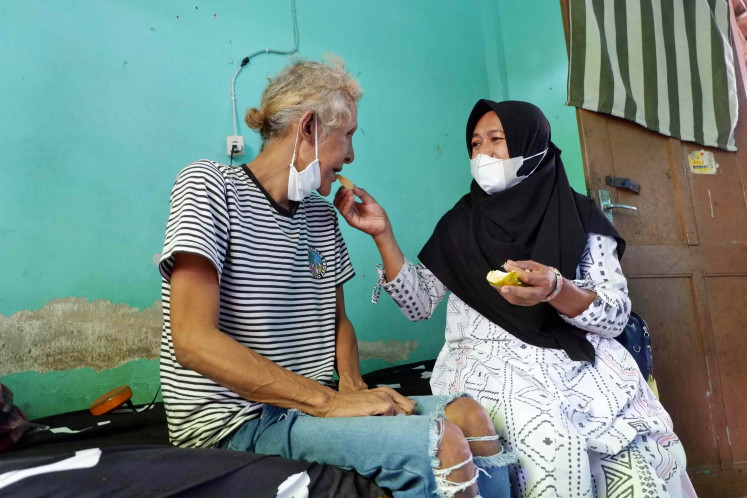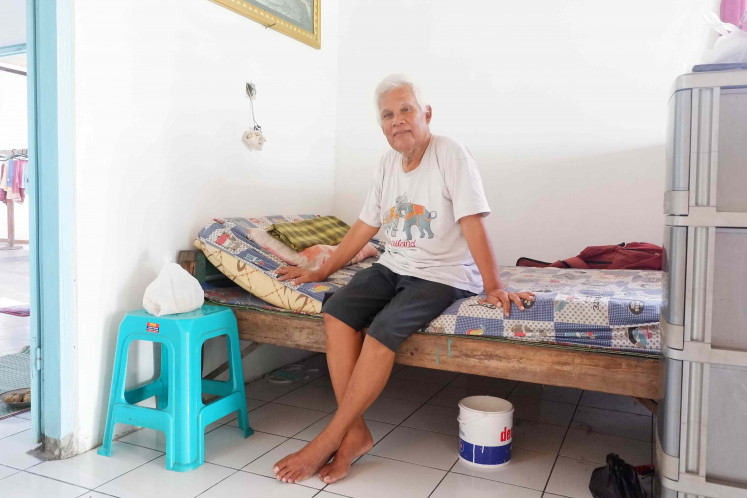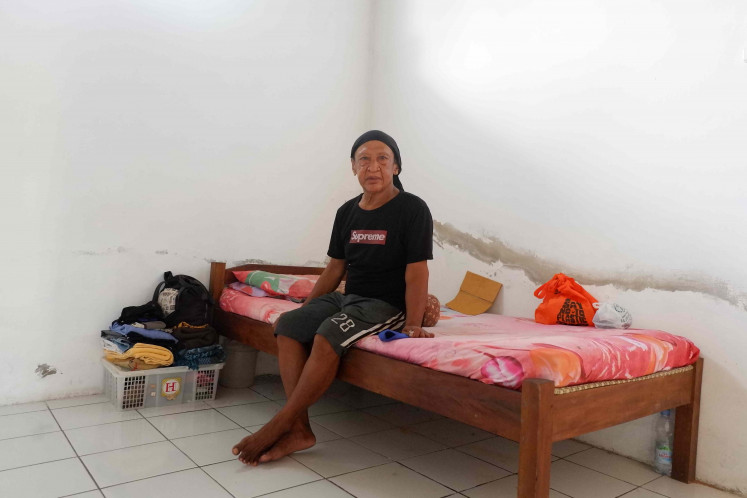Popular Reads
Top Results
Can't find what you're looking for?
View all search resultsPopular Reads
Top Results
Can't find what you're looking for?
View all search resultsHarrowing times: the challenges facing Yogyakarta’s trans women's crisis center
Rully Mallay has made a name for herself as Yogyakarta’s premiere transgender activist.
Change text size
Gift Premium Articles
to Anyone
Rully Mallay has made name for herself as Yogyakarta’s premiere transgender activist.
Clad in a hijab, the 61-year-old trans woman Rully Mallay leads the Waria Crisis Center (WCC), which helps transgender women in Yogyakarta deal with the numerous economic, social and legal challenges they face - amid stigma and discrimination toward sexual and gender minorities.
The center has set up a special shelter in Bantul regency to take care of ill and elderly trans women. Opened in August 2021, the shelter allows sick, older trans women to stay for free, with food, medicine and other basic needs provided by the WCC.
A caring trans woman: Rully Mallay, who has been a transgender activist since 2007, set up the Waria Crisis Center in Yogyakarta to help trans women solve economic, social and legal issues in the province. (JP/A. Kurniawan Ulung) (JP/A. Kurniawan Ulung)
Senior trans women drew Rully’s attention because like herself, they commonly experience age-related chronic conditions, such as osteoporosis, blood pressure and heart problems, but for a variety of reasons, most lack family members to take care of them. Since their younger days, most have lived alone after coming out as a trans woman and facing rejection from their family.
With the WCC in place, she hopes to help her fellow elderly trans women to not feel lonely and neglected.
“At this shelter, [the interactions between the seniors] can reduce pain, even though they have serious illnesses,” Rully said.
For everyone
The WCC was founded by Rully and Shinta Ratri, the head of Al Fatah Islamic Boarding School for transgender women, in 2019.
For them, the center matters because trans women in Yogyakarta remain vulnerable to violence, something they learned firsthand in 2016, when the hardline group Islamic Jihad Front (FJI) forced their way into Al Fatah to order Shinta to shut down her school.
The group’s demands prompted Rully and Shinta to set up a safe house at an undisclosed location for trans women of any age to hide because the attack made them feel unsafe and frightened.
“We later realized that this safe house was limited in its function, because it accommodated only trans people who faced violence and therefore, people outside [that category] could not have access to it,” she said.
Rully and Shinta then decided to expand the scope of their assistance through the WCC. At this center, they help not only trans women who experience violence, but also others who face economic, social and legal issues.
With the help of rights group Yogyakarta Legal Aid Institute (LBH Yogyakarta), the WCC, for example, provided legal services to a trans beautician accused of committing malpractice, not long after its establishment. The WCC and LBH Yogyakarta accompanied her to court.
“She was later set free because she was proven innocent,” Rully recalled.
Pandemic
The idea to set up a free shelter for ill elderly trans women came to Rully’s mind during the pandemic.
The pandemic has been a big blow financially to trans women of all ages across Yogyakarta. According to Rully, the majority of them work as street singers but their income decreased significantly, particularly during tight public activity restrictions, because the government forced them to stay at home.
Rully said that the health of many elderly trans women plunged because they could not get income to afford nutritious food and medicine.
That situation motivated her to raise donations. Last year, she managed to collect donations amounting to Rp 146 million (US$10,170). She distributed this financial assistance to trans women in Yogyakarta in the form of cash, meals and grocery packages. She used the remaining money, which amounted to Rp 13 million, to rent a house that the WCC utilizes as the shelter for ill, elderly trans women.
Rully knows how to get financial assistance, thanks to her wide network as the program manager of the Keluarga Besar Waria Yogyakarta (Kebaya) Foundation, a Yogyakarta-based NGO that provides free shelter and assistance to people with HIV/AIDS. Since 2007, she has been seeking financial aid to run the foundation’s programs.
With the donations in place, the residents of the WCC shelter do not need to pay for the good care they receive.
“At this shelter, we always remind them to follow their doctor’s advice and take medicine routinely,” Rully said.
As such, she encourages older trans women in poor health to stay at the shelter. At the shelter, they will also have friends, whereas in rooming houses they live alone. She worries about their solitary lives because no one is going to help them in an emergency situation.
Her worries are not baseless. Rully recently found a sick, old trans woman in a harrowing situation in a rooming house, with feces and vomit on the floor and bed, she was taken to the shelter.
Wholehearted: Rully Mallay (right) takes care of ill elderly trans women with all her heart. She ensures that they have medicine and nutrition to improve their health. (JP/A. Kurniawan Ulung) (JP/A. Kurniawan Ulung)Criminalization
Besides taking care of sick, elderly trans women, the WCC also helps trans women detained by the Yogyakarta administration.
Rully regularly visits Yogyakarta Social Agency camps, not only to give the detainees moral support and look in on their condition, but also to lobby the authorities to release them from detention.
“We have sent letters to ask for detention suspension and have provided guarantees, but we have not received a response yet,” she said.
Public Order Agency (Satpol PP) arrest the trans women for singing on the streets, claiming that they violate regional government regulation (Perda) No.1/2014 on the homeless and beggars.
Rully condemns the arrests because street singers are not beggars.
“This Perda has criminalized street singers. Street singers are also artists. They are not homeless because they have a place to live and clear jobs,” she said.
To shed light on the matter, she has invited public officials from the Yogyakarta administration to seminars and discussions hosted by the WCC, with academics from reputable universities as speakers, such as Yogyakarta State University (UNY) and Indonesia Arts Institute (ISI) Yogyakarta. However, they still do not view street singers as artists.
“To make them understand is very difficult,” she said.
Rully said that before the COVID-19 pandemic, the detainees had steady jobs, such as choreographers, singers and makeup artists. However, the pandemic forced them to busk because no events took place during public activity restrictions.
The arrests sadden her because they lack legal certainty. The authorities not only made the arrests without issuing a warrant, but also did not provide information on when the detainees would face trial and how long they would have to stay at the social agency’s camps. This uncertainty has cost them their part-time jobs.
“This is social injustice,” she said.
In recovery: Trans woman Edi Romlah, who suffers from diabetes and respiratory problems, is over the moon that she has seen big improvements in her health since living at the WCC’s shelter. (JP/A. Kurniawan Ulung) (JP/A. Kurniawan Ulung)Caring soul at heart
Street singer Edi Romlah, who suffers from complications including diabetes, heart and respiratory problems, says that her health condition has improved since she moved into the WCC’s shelter, thanks to Rully who routinely monitors her food intake and medication schedule.
Before meeting Rully, the 67-year-old trans woman never knew what diseases she suffered from. She never went for a medical checkup because she could not afford it. When her health declined, she always bore the pain, until one day she collapsed and was rushed to a hospital.
After leaving the hospital, Edi was persuaded by Rully to leave her rooming house and move to the WCC shelter. Rully was worried that Edi would be too late to get help if she was left alone.
“Bu [mother] Rully is a caring person,” said Edi.
Trans woman Heru Cahyono, 69, is grateful for the care she gets at the shelter though she no longer has an income. After suffering from chronic heart and kidney diseases, she finds it difficult to continue to work. She was a street singer.
Former street singer: Trans woman Heru Cahyono, 69, finds happiness at the WCC’s shelter because she gets good care for free. She no longer works due to her chronic heart and kidney conditions. She had been a street singer for over 40 years. (JP/A. Kurniawan Ulung) (JP/A. Kurniawan Ulung)Heru grew up in Kediri, East Java. After coming out as a trans woman, she was expelled from her village, including by her family. “My father was furious at me when I dressed up like a girl,” he recalled.
In 1976, she moved to Yogyakarta. Since then she has cut off contact with her family in Kediri and has never returned to the city.
“I do not know how and where they [her siblings] are now,” she said.
Heru is no longer lonely. For her, the WCC’s shelter is a home and other elderly trans women at the center are her new family members.
"I have a peaceful life here," she said.

